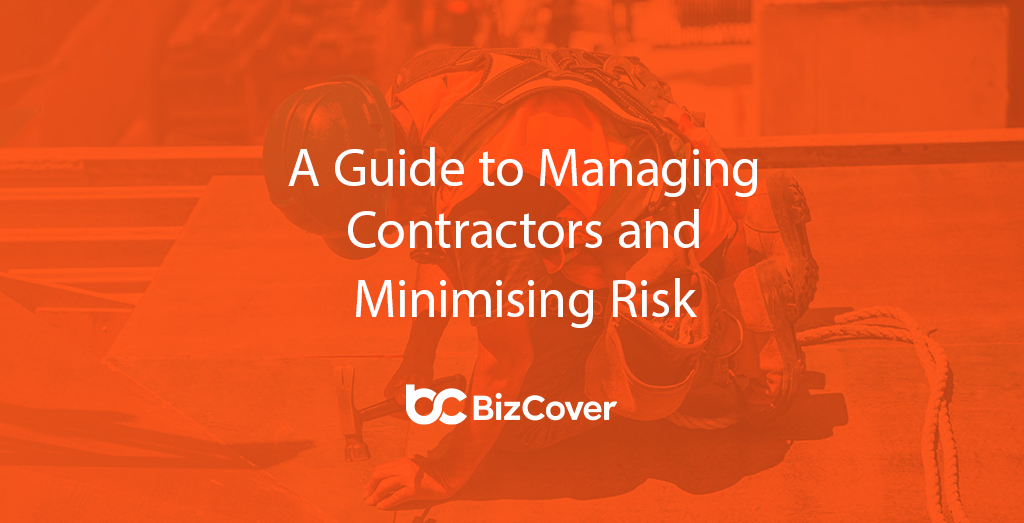A guide to managing contractors and minimising risk
When your business uses contractors to perform certain services on your behalf, there is always the potential risks for things to go wrong. Our guide looks at some tips on how you can minimise risk and the steps you can put in place to create a safe and effective working relationship with your contractors.
Setting the framework
One of the first things you need to implement when working with contractors is to have a solid framework in place that outlines the relationship between your business and the contractors you hire. This can start by creating a formal policy which will detail things like:
- Applicable policies and procedures
- Induction process
- The management and supervision of contractors
- Required checks- e.g. are all business insurance policies up to date with adequate cover
As a business owner it becomes your responsibility to ensure your contractors are following the correct policies and procedures in place. It’s a good idea to regularly audit and update your policies to ensure they are relevant.
Pre-project planning
Before you start hiring your contractors, ensure you understand the full scope of the project they will be working on, and have clear outlines of what will be needed including any required pre-work. Having clear stages of what the project will involve makes the process easier for everyone to understand and what to expect through the different phases.
Having an overview of the project also allows you to identify which areas of the project will involve special skill sets and potentially plan for the types of contract workers you will need to hire to get the job done.
Tips for choosing the right contractor for the job
Compliance is always a big focus when it comes to hiring contractors for your business. With many different local, state and federal regulations, it is important that when considering different contractors for employment that their details are all up to date.
These include things like relevant licenses, registrations and business insurance for example. Make sure your contractors provide up-to-date copies of their documents so that you can keep these on file.
Take the time to also cross check that the contractor has all the required experience for the job at hand. Ask them to provide references like previous employers and do a check to make sure everything is accurate. You might even want to go the extra mile and ask for them to also provide proof of education documents like certificates and degrees too.
Safety in the workplace should always be a priority and that’s why you may also want to check that they have a work safety statement or safety policy that they can provide on request. If they cannot provide a safety policy or work method statement then they may not be the right candidate for the job.
Make your expectations clear
If the type of contractors you are hiring are going to require a team of employees, you need to make sure they understand what you expect from them. When they are managing a team, they need to understand that they will be held responsible for all employees working on the project, which may involve checking that they are properly qualified and following the right policies and procedures.
In some instances, the contractor may use subcontractors, meaning they should provide notification prior to commencing any subcontracting of work and clearly outline the selection criteria prior to them being hired to assist.
On site supervision
You may want to look at delegating this task to one of your experienced and suitable staff to handle. This will involve overseeing the contractor, keeping an eye on the quality of their work, managing the compliance side of things with the site and that the right policies and procedures are being followed.
Having regular meetings with the contractor creates an opportunity to discuss how the project is travelling, if there are any issues that need to be addressed and to communicate any key information that they may need to be aware of.
Run an induction
If you don’t already have an induction process in place, it might be something worth considering, not just for contractors but for all staff to attend. It’s a chance to communicate the key policies and procedures of your business, reinforcing safety and care within your workplace.
Having an induction for your contractors allows them to become familiar with what is required of them whilst working for your business. It also allows them to understand things like any unique features of your business premises that they may need to be aware of, process hazards, protection systems you may have in place and any special training if required.
Once your contractors and employees have completed the induction, keep records of the date of induction, who ran it and when the next re-induction may be required if working with long-term contractors.
Some of the topics you may want to cover in your induction could include:
- Information about site access and identification
- Hazards on site
- Instructions on how to work with dangerous goods and processes
- Housekeeping
- Fire drills
- What to do in an emergency
- Security
Ensure your contractors have insurance
Another key thing you need to check with your contractors is that they have the right types of insurance and adequate amount of cover in place. You need to also check that their policy is current and that they can produce a copy of their certificate of currency.
Some of the types of business insurance that you may be checking include Public Liability insurance* and Professional Indemnity insurance*. These are two very different types of insurances and may not both be required.
If your contractor is in need of renewing and updating their insurance policy fear not. At BizCover we provide business insurance solutions for contractors in the click of button or a quick call on the phone. We offer insurance for tradies to insurance for professionals and many more without the drama.
We deliver multiple quotes from selected leading Australian insurers and you can get cover sorted in minutes, with certificates of currencies delivered straight to your inbox once your policy is purchased.
This information is general only and does not take into account your objectives, financial situation or needs. It should not be relied upon as advice. As with any insurance, cover will be subject to the terms, conditions and exclusions contained in the policy wording. © 2025 BizCover Limited.





